Ethics and Audit Quality: Stakeholder Analysis, Independence, and Whistleblowing in HI6026 Study
VerifiedAdded on 2023/04/23
|14
|4119
|166
AI Summary
The study focuses on audit, assurance, compliance, and ethics, emphasizing the importance of maintaining ethical standards in audits.It discusses stakeholders and their impact on audit quality, with a specific analysis of Wesfarmers as a key stakeholder.The study explores the concepts of auditor independence, whistleblowing, and their relation to public interest requirements.
Contribute Materials
Your contribution can guide someone’s learning journey. Share your
documents today.
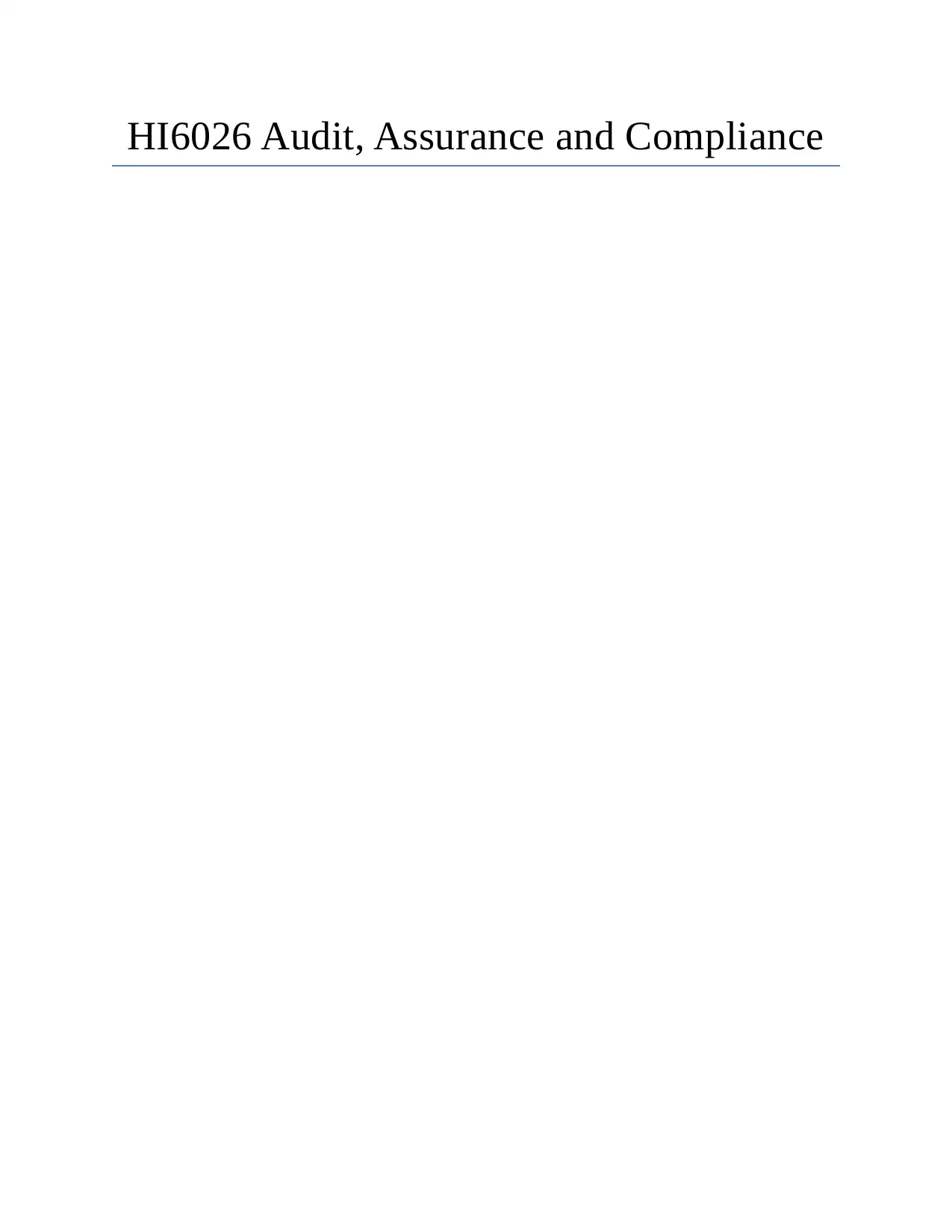
HI6026 Audit, Assurance and Compliance
Secure Best Marks with AI Grader
Need help grading? Try our AI Grader for instant feedback on your assignments.
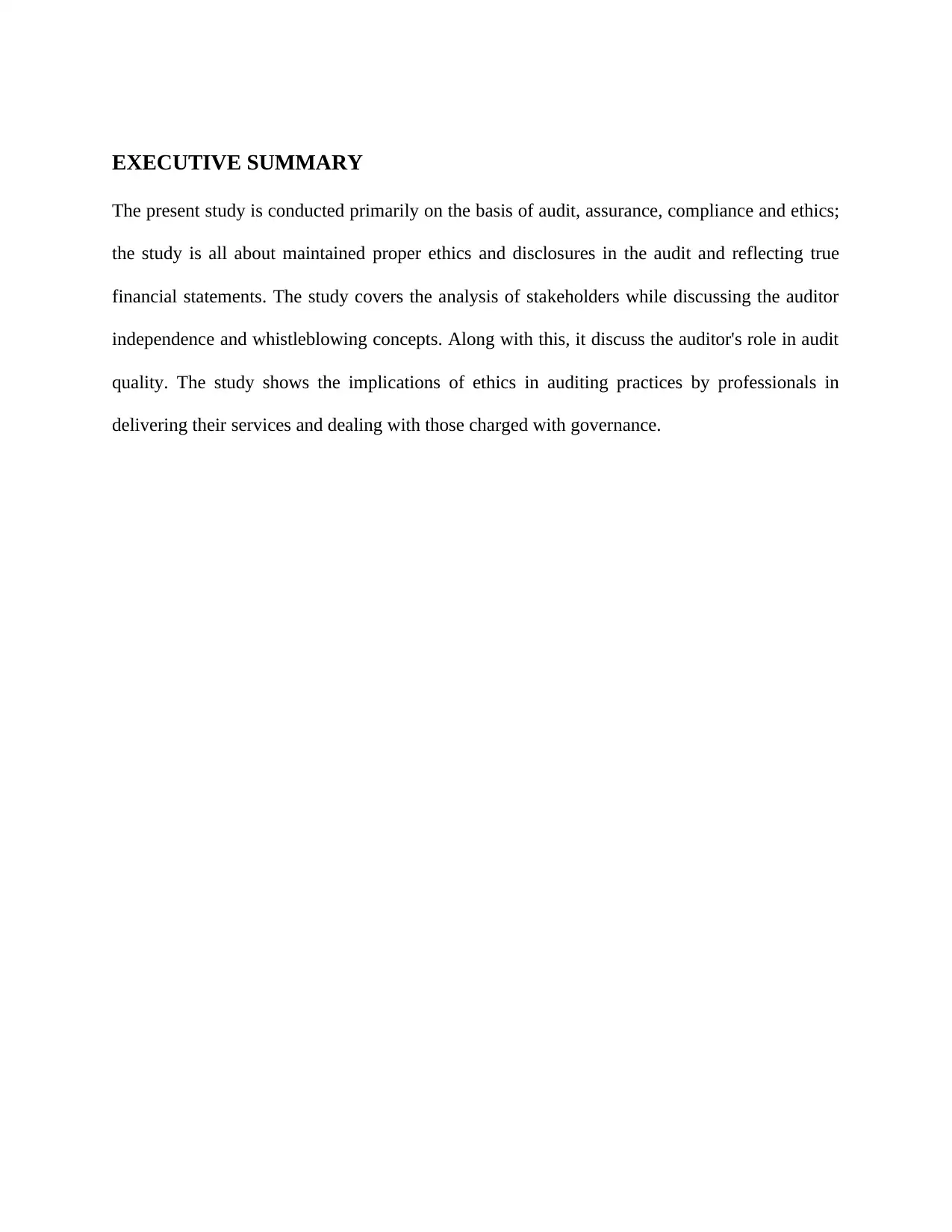
EXECUTIVE SUMMARY
The present study is conducted primarily on the basis of audit, assurance, compliance and ethics;
the study is all about maintained proper ethics and disclosures in the audit and reflecting true
financial statements. The study covers the analysis of stakeholders while discussing the auditor
independence and whistleblowing concepts. Along with this, it discuss the auditor's role in audit
quality. The study shows the implications of ethics in auditing practices by professionals in
delivering their services and dealing with those charged with governance.
The present study is conducted primarily on the basis of audit, assurance, compliance and ethics;
the study is all about maintained proper ethics and disclosures in the audit and reflecting true
financial statements. The study covers the analysis of stakeholders while discussing the auditor
independence and whistleblowing concepts. Along with this, it discuss the auditor's role in audit
quality. The study shows the implications of ethics in auditing practices by professionals in
delivering their services and dealing with those charged with governance.
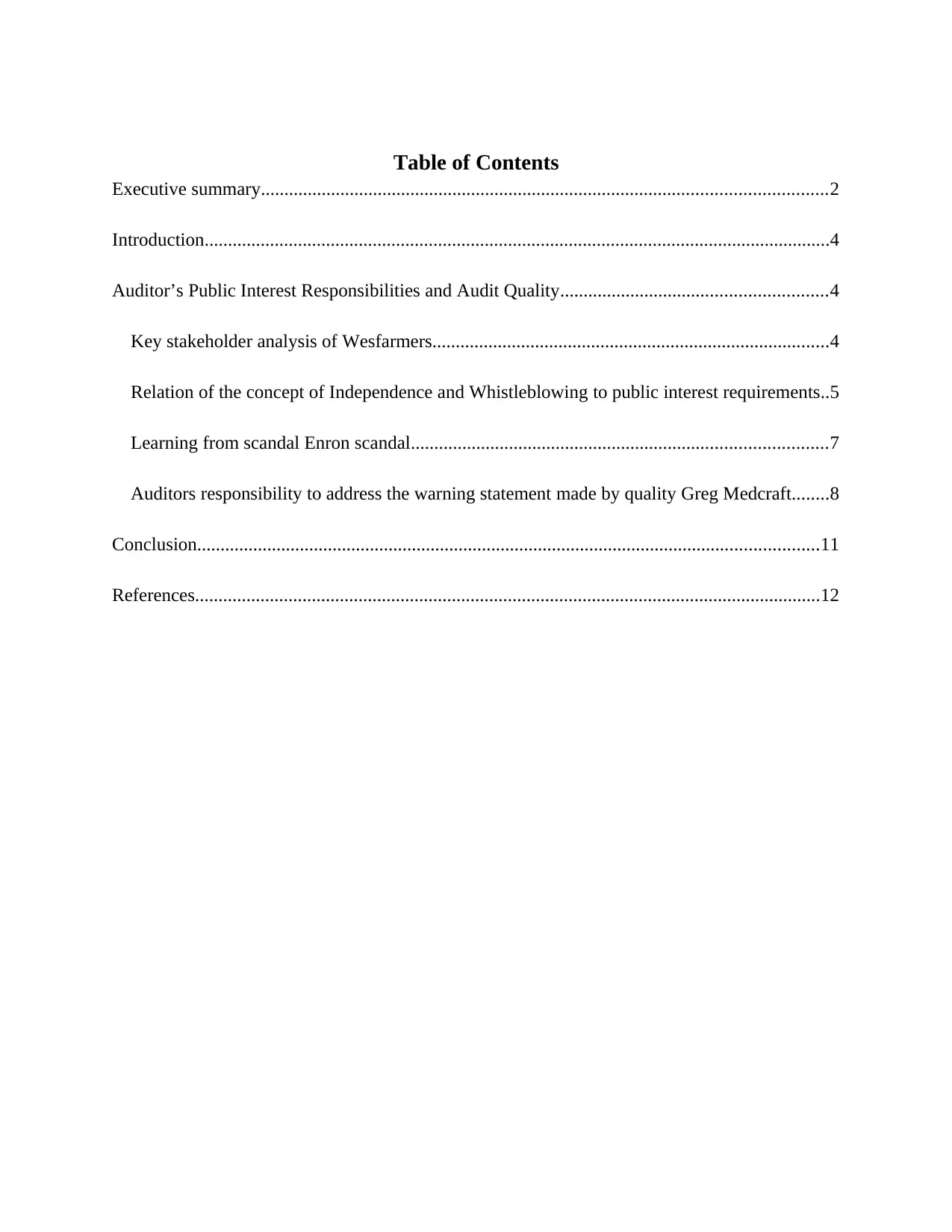
Table of Contents
Executive summary.........................................................................................................................2
Introduction......................................................................................................................................4
Auditor’s Public Interest Responsibilities and Audit Quality.........................................................4
Key stakeholder analysis of Wesfarmers.....................................................................................4
Relation of the concept of Independence and Whistleblowing to public interest requirements..5
Learning from scandal Enron scandal.........................................................................................7
Auditors responsibility to address the warning statement made by quality Greg Medcraft........8
Conclusion.....................................................................................................................................11
References......................................................................................................................................12
Executive summary.........................................................................................................................2
Introduction......................................................................................................................................4
Auditor’s Public Interest Responsibilities and Audit Quality.........................................................4
Key stakeholder analysis of Wesfarmers.....................................................................................4
Relation of the concept of Independence and Whistleblowing to public interest requirements..5
Learning from scandal Enron scandal.........................................................................................7
Auditors responsibility to address the warning statement made by quality Greg Medcraft........8
Conclusion.....................................................................................................................................11
References......................................................................................................................................12
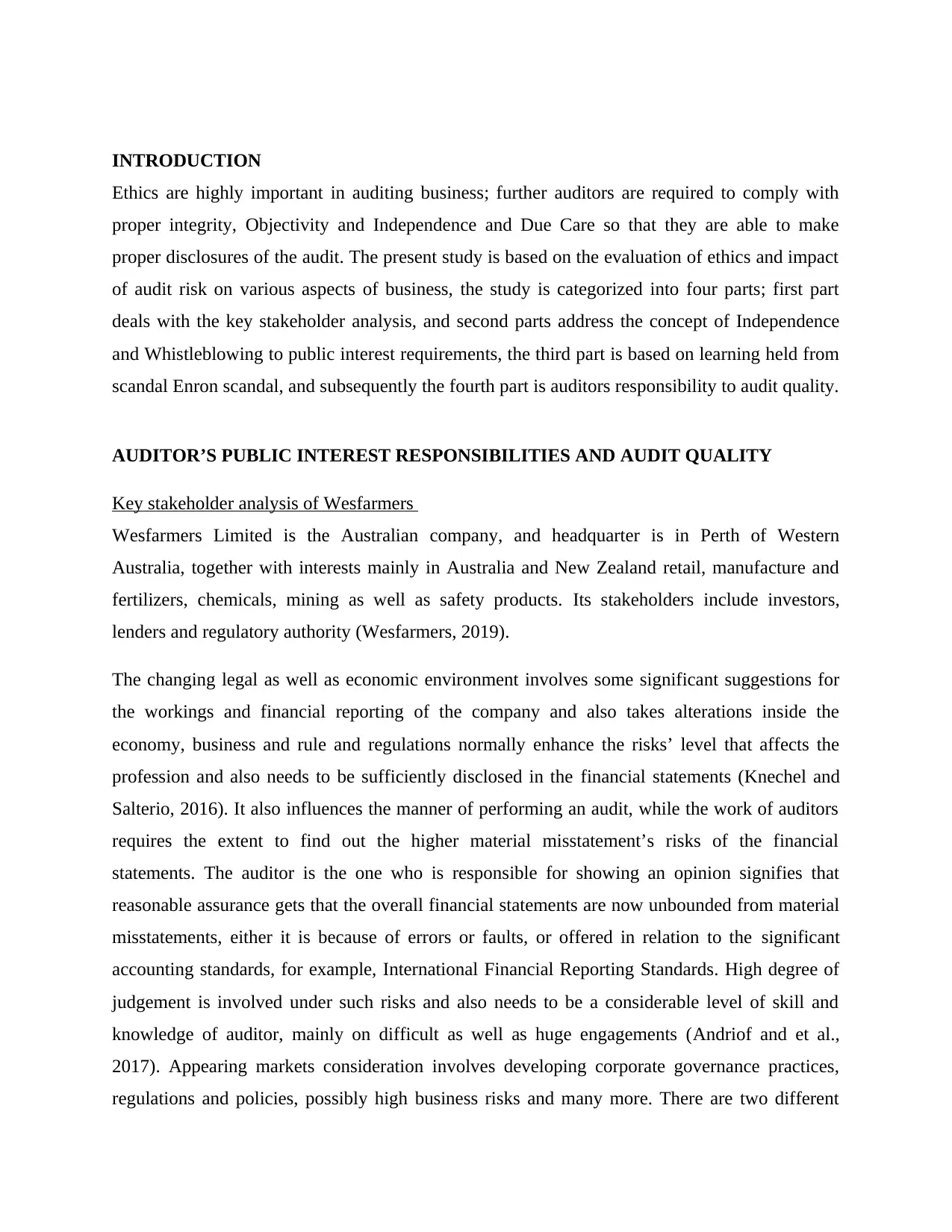
INTRODUCTION
Ethics are highly important in auditing business; further auditors are required to comply with
proper integrity, Objectivity and Independence and Due Care so that they are able to make
proper disclosures of the audit. The present study is based on the evaluation of ethics and impact
of audit risk on various aspects of business, the study is categorized into four parts; first part
deals with the key stakeholder analysis, and second parts address the concept of Independence
and Whistleblowing to public interest requirements, the third part is based on learning held from
scandal Enron scandal, and subsequently the fourth part is auditors responsibility to audit quality.
AUDITOR’S PUBLIC INTEREST RESPONSIBILITIES AND AUDIT QUALITY
Key stakeholder analysis of Wesfarmers
Wesfarmers Limited is the Australian company, and headquarter is in Perth of Western
Australia, together with interests mainly in Australia and New Zealand retail, manufacture and
fertilizers, chemicals, mining as well as safety products. Its stakeholders include investors,
lenders and regulatory authority (Wesfarmers, 2019).
The changing legal as well as economic environment involves some significant suggestions for
the workings and financial reporting of the company and also takes alterations inside the
economy, business and rule and regulations normally enhance the risks’ level that affects the
profession and also needs to be sufficiently disclosed in the financial statements (Knechel and
Salterio, 2016). It also influences the manner of performing an audit, while the work of auditors
requires the extent to find out the higher material misstatement’s risks of the financial
statements. The auditor is the one who is responsible for showing an opinion signifies that
reasonable assurance gets that the overall financial statements are now unbounded from material
misstatements, either it is because of errors or faults, or offered in relation to the significant
accounting standards, for example, International Financial Reporting Standards. High degree of
judgement is involved under such risks and also needs to be a considerable level of skill and
knowledge of auditor, mainly on difficult as well as huge engagements (Andriof and et al.,
2017). Appearing markets consideration involves developing corporate governance practices,
regulations and policies, possibly high business risks and many more. There are two different
Ethics are highly important in auditing business; further auditors are required to comply with
proper integrity, Objectivity and Independence and Due Care so that they are able to make
proper disclosures of the audit. The present study is based on the evaluation of ethics and impact
of audit risk on various aspects of business, the study is categorized into four parts; first part
deals with the key stakeholder analysis, and second parts address the concept of Independence
and Whistleblowing to public interest requirements, the third part is based on learning held from
scandal Enron scandal, and subsequently the fourth part is auditors responsibility to audit quality.
AUDITOR’S PUBLIC INTEREST RESPONSIBILITIES AND AUDIT QUALITY
Key stakeholder analysis of Wesfarmers
Wesfarmers Limited is the Australian company, and headquarter is in Perth of Western
Australia, together with interests mainly in Australia and New Zealand retail, manufacture and
fertilizers, chemicals, mining as well as safety products. Its stakeholders include investors,
lenders and regulatory authority (Wesfarmers, 2019).
The changing legal as well as economic environment involves some significant suggestions for
the workings and financial reporting of the company and also takes alterations inside the
economy, business and rule and regulations normally enhance the risks’ level that affects the
profession and also needs to be sufficiently disclosed in the financial statements (Knechel and
Salterio, 2016). It also influences the manner of performing an audit, while the work of auditors
requires the extent to find out the higher material misstatement’s risks of the financial
statements. The auditor is the one who is responsible for showing an opinion signifies that
reasonable assurance gets that the overall financial statements are now unbounded from material
misstatements, either it is because of errors or faults, or offered in relation to the significant
accounting standards, for example, International Financial Reporting Standards. High degree of
judgement is involved under such risks and also needs to be a considerable level of skill and
knowledge of auditor, mainly on difficult as well as huge engagements (Andriof and et al.,
2017). Appearing markets consideration involves developing corporate governance practices,
regulations and policies, possibly high business risks and many more. There are two different
Secure Best Marks with AI Grader
Need help grading? Try our AI Grader for instant feedback on your assignments.
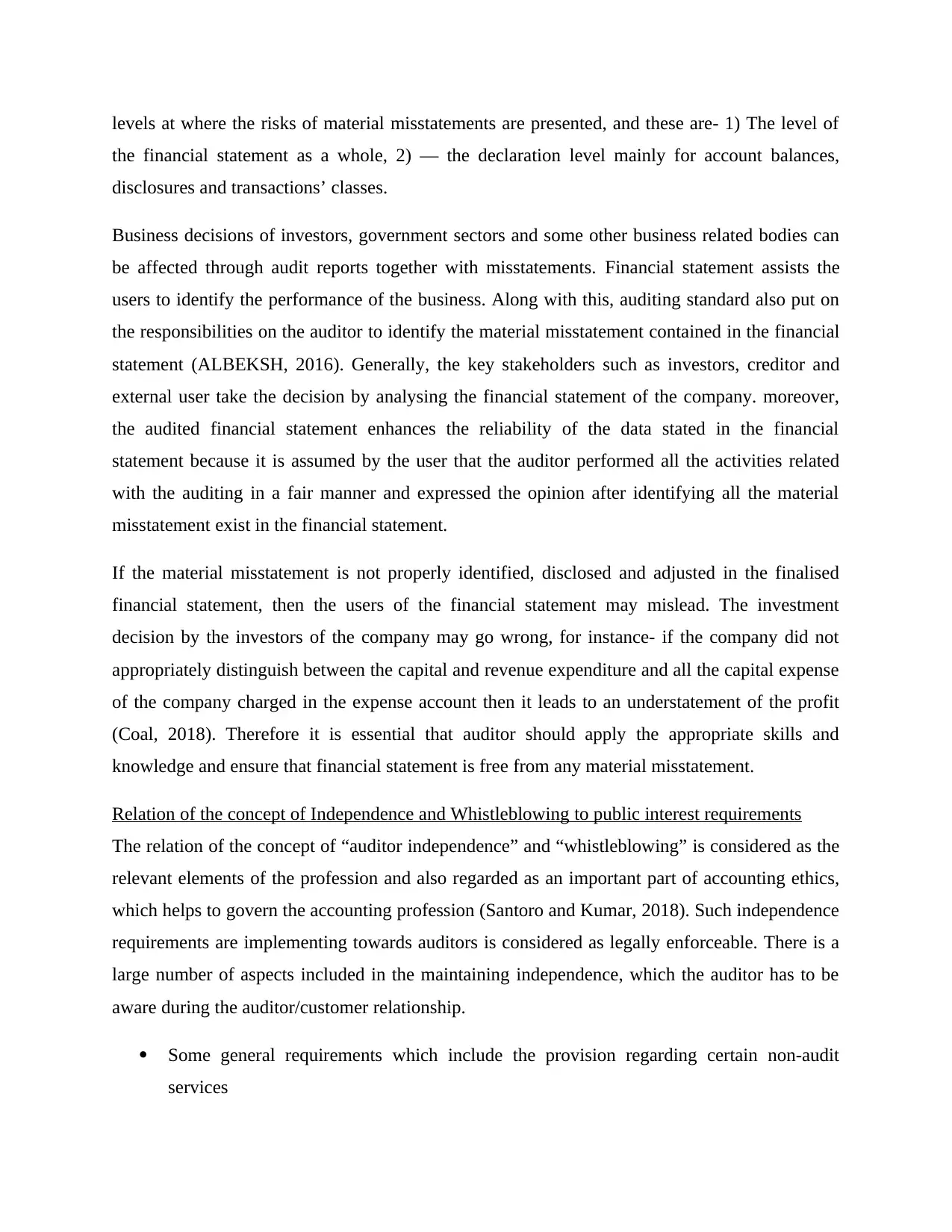
levels at where the risks of material misstatements are presented, and these are- 1) The level of
the financial statement as a whole, 2) — the declaration level mainly for account balances,
disclosures and transactions’ classes.
Business decisions of investors, government sectors and some other business related bodies can
be affected through audit reports together with misstatements. Financial statement assists the
users to identify the performance of the business. Along with this, auditing standard also put on
the responsibilities on the auditor to identify the material misstatement contained in the financial
statement (ALBEKSH, 2016). Generally, the key stakeholders such as investors, creditor and
external user take the decision by analysing the financial statement of the company. moreover,
the audited financial statement enhances the reliability of the data stated in the financial
statement because it is assumed by the user that the auditor performed all the activities related
with the auditing in a fair manner and expressed the opinion after identifying all the material
misstatement exist in the financial statement.
If the material misstatement is not properly identified, disclosed and adjusted in the finalised
financial statement, then the users of the financial statement may mislead. The investment
decision by the investors of the company may go wrong, for instance- if the company did not
appropriately distinguish between the capital and revenue expenditure and all the capital expense
of the company charged in the expense account then it leads to an understatement of the profit
(Coal, 2018). Therefore it is essential that auditor should apply the appropriate skills and
knowledge and ensure that financial statement is free from any material misstatement.
Relation of the concept of Independence and Whistleblowing to public interest requirements
The relation of the concept of “auditor independence” and “whistleblowing” is considered as the
relevant elements of the profession and also regarded as an important part of accounting ethics,
which helps to govern the accounting profession (Santoro and Kumar, 2018). Such independence
requirements are implementing towards auditors is considered as legally enforceable. There is a
large number of aspects included in the maintaining independence, which the auditor has to be
aware during the auditor/customer relationship.
Some general requirements which include the provision regarding certain non-audit
services
the financial statement as a whole, 2) — the declaration level mainly for account balances,
disclosures and transactions’ classes.
Business decisions of investors, government sectors and some other business related bodies can
be affected through audit reports together with misstatements. Financial statement assists the
users to identify the performance of the business. Along with this, auditing standard also put on
the responsibilities on the auditor to identify the material misstatement contained in the financial
statement (ALBEKSH, 2016). Generally, the key stakeholders such as investors, creditor and
external user take the decision by analysing the financial statement of the company. moreover,
the audited financial statement enhances the reliability of the data stated in the financial
statement because it is assumed by the user that the auditor performed all the activities related
with the auditing in a fair manner and expressed the opinion after identifying all the material
misstatement exist in the financial statement.
If the material misstatement is not properly identified, disclosed and adjusted in the finalised
financial statement, then the users of the financial statement may mislead. The investment
decision by the investors of the company may go wrong, for instance- if the company did not
appropriately distinguish between the capital and revenue expenditure and all the capital expense
of the company charged in the expense account then it leads to an understatement of the profit
(Coal, 2018). Therefore it is essential that auditor should apply the appropriate skills and
knowledge and ensure that financial statement is free from any material misstatement.
Relation of the concept of Independence and Whistleblowing to public interest requirements
The relation of the concept of “auditor independence” and “whistleblowing” is considered as the
relevant elements of the profession and also regarded as an important part of accounting ethics,
which helps to govern the accounting profession (Santoro and Kumar, 2018). Such independence
requirements are implementing towards auditors is considered as legally enforceable. There is a
large number of aspects included in the maintaining independence, which the auditor has to be
aware during the auditor/customer relationship.
Some general requirements which include the provision regarding certain non-audit
services
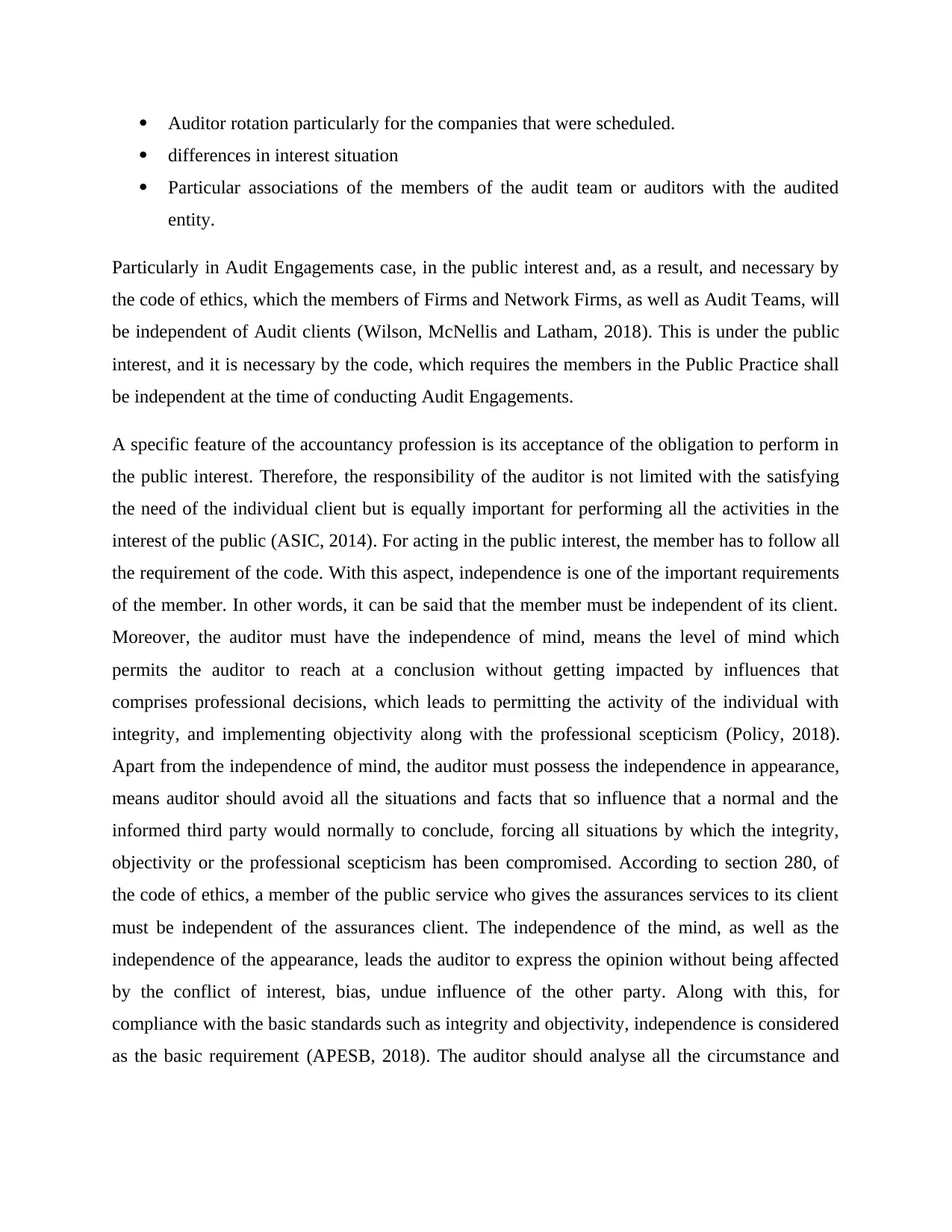
Auditor rotation particularly for the companies that were scheduled.
differences in interest situation
Particular associations of the members of the audit team or auditors with the audited
entity.
Particularly in Audit Engagements case, in the public interest and, as a result, and necessary by
the code of ethics, which the members of Firms and Network Firms, as well as Audit Teams, will
be independent of Audit clients (Wilson, McNellis and Latham, 2018). This is under the public
interest, and it is necessary by the code, which requires the members in the Public Practice shall
be independent at the time of conducting Audit Engagements.
A specific feature of the accountancy profession is its acceptance of the obligation to perform in
the public interest. Therefore, the responsibility of the auditor is not limited with the satisfying
the need of the individual client but is equally important for performing all the activities in the
interest of the public (ASIC, 2014). For acting in the public interest, the member has to follow all
the requirement of the code. With this aspect, independence is one of the important requirements
of the member. In other words, it can be said that the member must be independent of its client.
Moreover, the auditor must have the independence of mind, means the level of mind which
permits the auditor to reach at a conclusion without getting impacted by influences that
comprises professional decisions, which leads to permitting the activity of the individual with
integrity, and implementing objectivity along with the professional scepticism (Policy, 2018).
Apart from the independence of mind, the auditor must possess the independence in appearance,
means auditor should avoid all the situations and facts that so influence that a normal and the
informed third party would normally to conclude, forcing all situations by which the integrity,
objectivity or the professional scepticism has been compromised. According to section 280, of
the code of ethics, a member of the public service who gives the assurances services to its client
must be independent of the assurances client. The independence of the mind, as well as the
independence of the appearance, leads the auditor to express the opinion without being affected
by the conflict of interest, bias, undue influence of the other party. Along with this, for
compliance with the basic standards such as integrity and objectivity, independence is considered
as the basic requirement (APESB, 2018). The auditor should analyse all the circumstance and
differences in interest situation
Particular associations of the members of the audit team or auditors with the audited
entity.
Particularly in Audit Engagements case, in the public interest and, as a result, and necessary by
the code of ethics, which the members of Firms and Network Firms, as well as Audit Teams, will
be independent of Audit clients (Wilson, McNellis and Latham, 2018). This is under the public
interest, and it is necessary by the code, which requires the members in the Public Practice shall
be independent at the time of conducting Audit Engagements.
A specific feature of the accountancy profession is its acceptance of the obligation to perform in
the public interest. Therefore, the responsibility of the auditor is not limited with the satisfying
the need of the individual client but is equally important for performing all the activities in the
interest of the public (ASIC, 2014). For acting in the public interest, the member has to follow all
the requirement of the code. With this aspect, independence is one of the important requirements
of the member. In other words, it can be said that the member must be independent of its client.
Moreover, the auditor must have the independence of mind, means the level of mind which
permits the auditor to reach at a conclusion without getting impacted by influences that
comprises professional decisions, which leads to permitting the activity of the individual with
integrity, and implementing objectivity along with the professional scepticism (Policy, 2018).
Apart from the independence of mind, the auditor must possess the independence in appearance,
means auditor should avoid all the situations and facts that so influence that a normal and the
informed third party would normally to conclude, forcing all situations by which the integrity,
objectivity or the professional scepticism has been compromised. According to section 280, of
the code of ethics, a member of the public service who gives the assurances services to its client
must be independent of the assurances client. The independence of the mind, as well as the
independence of the appearance, leads the auditor to express the opinion without being affected
by the conflict of interest, bias, undue influence of the other party. Along with this, for
compliance with the basic standards such as integrity and objectivity, independence is considered
as the basic requirement (APESB, 2018). The auditor should analyse all the circumstance and
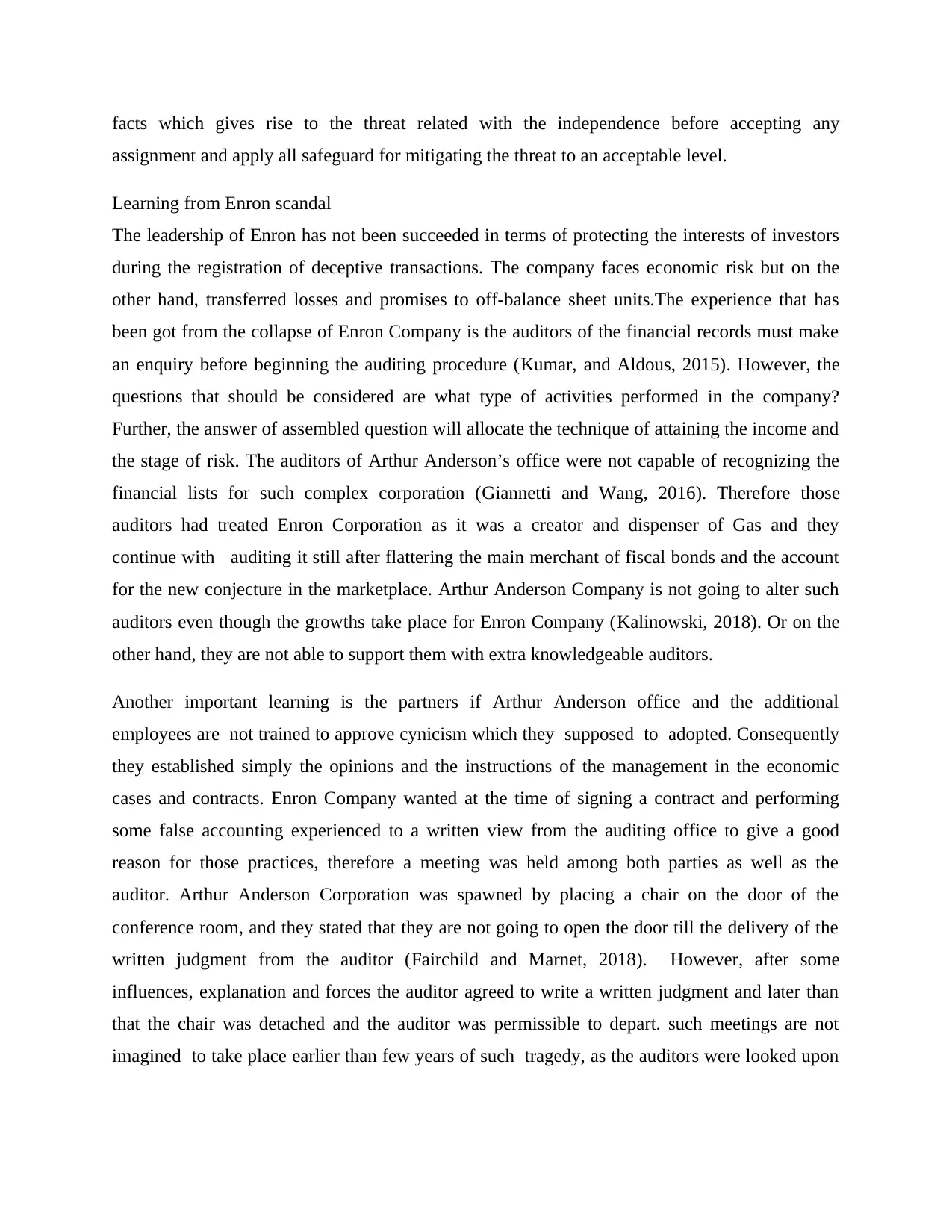
facts which gives rise to the threat related with the independence before accepting any
assignment and apply all safeguard for mitigating the threat to an acceptable level.
Learning from Enron scandal
The leadership of Enron has not been succeeded in terms of protecting the interests of investors
during the registration of deceptive transactions. The company faces economic risk but on the
other hand, transferred losses and promises to off-balance sheet units.The experience that has
been got from the collapse of Enron Company is the auditors of the financial records must make
an enquiry before beginning the auditing procedure (Kumar, and Aldous, 2015). However, the
questions that should be considered are what type of activities performed in the company?
Further, the answer of assembled question will allocate the technique of attaining the income and
the stage of risk. The auditors of Arthur Anderson’s office were not capable of recognizing the
financial lists for such complex corporation (Giannetti and Wang, 2016). Therefore those
auditors had treated Enron Corporation as it was a creator and dispenser of Gas and they
continue with auditing it still after flattering the main merchant of fiscal bonds and the account
for the new conjecture in the marketplace. Arthur Anderson Company is not going to alter such
auditors even though the growths take place for Enron Company (Kalinowski, 2018). Or on the
other hand, they are not able to support them with extra knowledgeable auditors.
Another important learning is the partners if Arthur Anderson office and the additional
employees are not trained to approve cynicism which they supposed to adopted. Consequently
they established simply the opinions and the instructions of the management in the economic
cases and contracts. Enron Company wanted at the time of signing a contract and performing
some false accounting experienced to a written view from the auditing office to give a good
reason for those practices, therefore a meeting was held among both parties as well as the
auditor. Arthur Anderson Corporation was spawned by placing a chair on the door of the
conference room, and they stated that they are not going to open the door till the delivery of the
written judgment from the auditor (Fairchild and Marnet, 2018). However, after some
influences, explanation and forces the auditor agreed to write a written judgment and later than
that the chair was detached and the auditor was permissible to depart. such meetings are not
imagined to take place earlier than few years of such tragedy, as the auditors were looked upon
assignment and apply all safeguard for mitigating the threat to an acceptable level.
Learning from Enron scandal
The leadership of Enron has not been succeeded in terms of protecting the interests of investors
during the registration of deceptive transactions. The company faces economic risk but on the
other hand, transferred losses and promises to off-balance sheet units.The experience that has
been got from the collapse of Enron Company is the auditors of the financial records must make
an enquiry before beginning the auditing procedure (Kumar, and Aldous, 2015). However, the
questions that should be considered are what type of activities performed in the company?
Further, the answer of assembled question will allocate the technique of attaining the income and
the stage of risk. The auditors of Arthur Anderson’s office were not capable of recognizing the
financial lists for such complex corporation (Giannetti and Wang, 2016). Therefore those
auditors had treated Enron Corporation as it was a creator and dispenser of Gas and they
continue with auditing it still after flattering the main merchant of fiscal bonds and the account
for the new conjecture in the marketplace. Arthur Anderson Company is not going to alter such
auditors even though the growths take place for Enron Company (Kalinowski, 2018). Or on the
other hand, they are not able to support them with extra knowledgeable auditors.
Another important learning is the partners if Arthur Anderson office and the additional
employees are not trained to approve cynicism which they supposed to adopted. Consequently
they established simply the opinions and the instructions of the management in the economic
cases and contracts. Enron Company wanted at the time of signing a contract and performing
some false accounting experienced to a written view from the auditing office to give a good
reason for those practices, therefore a meeting was held among both parties as well as the
auditor. Arthur Anderson Corporation was spawned by placing a chair on the door of the
conference room, and they stated that they are not going to open the door till the delivery of the
written judgment from the auditor (Fairchild and Marnet, 2018). However, after some
influences, explanation and forces the auditor agreed to write a written judgment and later than
that the chair was detached and the auditor was permissible to depart. such meetings are not
imagined to take place earlier than few years of such tragedy, as the auditors were looked upon
Paraphrase This Document
Need a fresh take? Get an instant paraphrase of this document with our AI Paraphraser
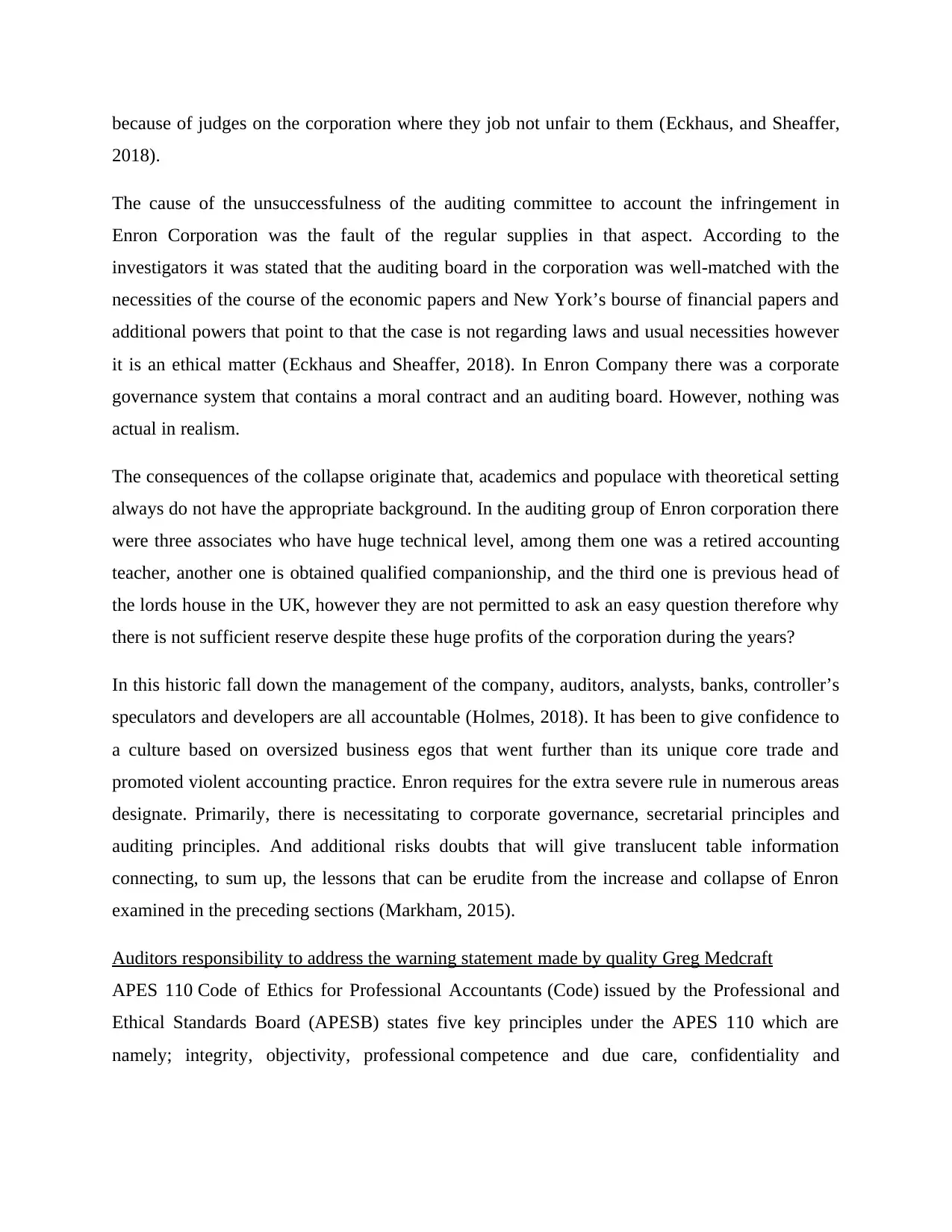
because of judges on the corporation where they job not unfair to them (Eckhaus, and Sheaffer,
2018).
The cause of the unsuccessfulness of the auditing committee to account the infringement in
Enron Corporation was the fault of the regular supplies in that aspect. According to the
investigators it was stated that the auditing board in the corporation was well-matched with the
necessities of the course of the economic papers and New York’s bourse of financial papers and
additional powers that point to that the case is not regarding laws and usual necessities however
it is an ethical matter (Eckhaus and Sheaffer, 2018). In Enron Company there was a corporate
governance system that contains a moral contract and an auditing board. However, nothing was
actual in realism.
The consequences of the collapse originate that, academics and populace with theoretical setting
always do not have the appropriate background. In the auditing group of Enron corporation there
were three associates who have huge technical level, among them one was a retired accounting
teacher, another one is obtained qualified companionship, and the third one is previous head of
the lords house in the UK, however they are not permitted to ask an easy question therefore why
there is not sufficient reserve despite these huge profits of the corporation during the years?
In this historic fall down the management of the company, auditors, analysts, banks, controller’s
speculators and developers are all accountable (Holmes, 2018). It has been to give confidence to
a culture based on oversized business egos that went further than its unique core trade and
promoted violent accounting practice. Enron requires for the extra severe rule in numerous areas
designate. Primarily, there is necessitating to corporate governance, secretarial principles and
auditing principles. And additional risks doubts that will give translucent table information
connecting, to sum up, the lessons that can be erudite from the increase and collapse of Enron
examined in the preceding sections (Markham, 2015).
Auditors responsibility to address the warning statement made by quality Greg Medcraft
APES 110 Code of Ethics for Professional Accountants (Code) issued by the Professional and
Ethical Standards Board (APESB) states five key principles under the APES 110 which are
namely; integrity, objectivity, professional competence and due care, confidentiality and
2018).
The cause of the unsuccessfulness of the auditing committee to account the infringement in
Enron Corporation was the fault of the regular supplies in that aspect. According to the
investigators it was stated that the auditing board in the corporation was well-matched with the
necessities of the course of the economic papers and New York’s bourse of financial papers and
additional powers that point to that the case is not regarding laws and usual necessities however
it is an ethical matter (Eckhaus and Sheaffer, 2018). In Enron Company there was a corporate
governance system that contains a moral contract and an auditing board. However, nothing was
actual in realism.
The consequences of the collapse originate that, academics and populace with theoretical setting
always do not have the appropriate background. In the auditing group of Enron corporation there
were three associates who have huge technical level, among them one was a retired accounting
teacher, another one is obtained qualified companionship, and the third one is previous head of
the lords house in the UK, however they are not permitted to ask an easy question therefore why
there is not sufficient reserve despite these huge profits of the corporation during the years?
In this historic fall down the management of the company, auditors, analysts, banks, controller’s
speculators and developers are all accountable (Holmes, 2018). It has been to give confidence to
a culture based on oversized business egos that went further than its unique core trade and
promoted violent accounting practice. Enron requires for the extra severe rule in numerous areas
designate. Primarily, there is necessitating to corporate governance, secretarial principles and
auditing principles. And additional risks doubts that will give translucent table information
connecting, to sum up, the lessons that can be erudite from the increase and collapse of Enron
examined in the preceding sections (Markham, 2015).
Auditors responsibility to address the warning statement made by quality Greg Medcraft
APES 110 Code of Ethics for Professional Accountants (Code) issued by the Professional and
Ethical Standards Board (APESB) states five key principles under the APES 110 which are
namely; integrity, objectivity, professional competence and due care, confidentiality and
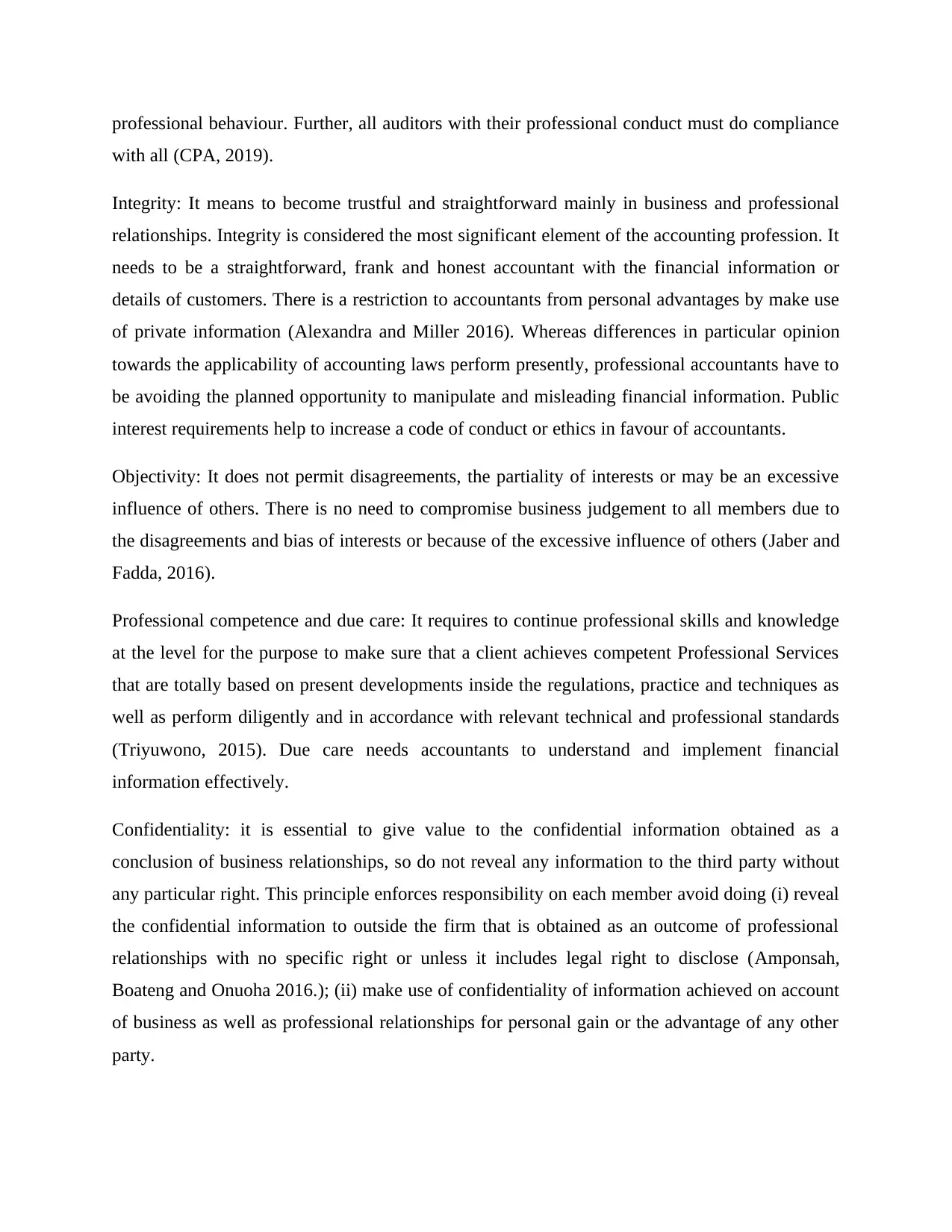
professional behaviour. Further, all auditors with their professional conduct must do compliance
with all (CPA, 2019).
Integrity: It means to become trustful and straightforward mainly in business and professional
relationships. Integrity is considered the most significant element of the accounting profession. It
needs to be a straightforward, frank and honest accountant with the financial information or
details of customers. There is a restriction to accountants from personal advantages by make use
of private information (Alexandra and Miller 2016). Whereas differences in particular opinion
towards the applicability of accounting laws perform presently, professional accountants have to
be avoiding the planned opportunity to manipulate and misleading financial information. Public
interest requirements help to increase a code of conduct or ethics in favour of accountants.
Objectivity: It does not permit disagreements, the partiality of interests or may be an excessive
influence of others. There is no need to compromise business judgement to all members due to
the disagreements and bias of interests or because of the excessive influence of others (Jaber and
Fadda, 2016).
Professional competence and due care: It requires to continue professional skills and knowledge
at the level for the purpose to make sure that a client achieves competent Professional Services
that are totally based on present developments inside the regulations, practice and techniques as
well as perform diligently and in accordance with relevant technical and professional standards
(Triyuwono, 2015). Due care needs accountants to understand and implement financial
information effectively.
Confidentiality: it is essential to give value to the confidential information obtained as a
conclusion of business relationships, so do not reveal any information to the third party without
any particular right. This principle enforces responsibility on each member avoid doing (i) reveal
the confidential information to outside the firm that is obtained as an outcome of professional
relationships with no specific right or unless it includes legal right to disclose (Amponsah,
Boateng and Onuoha 2016.); (ii) make use of confidentiality of information achieved on account
of business as well as professional relationships for personal gain or the advantage of any other
party.
with all (CPA, 2019).
Integrity: It means to become trustful and straightforward mainly in business and professional
relationships. Integrity is considered the most significant element of the accounting profession. It
needs to be a straightforward, frank and honest accountant with the financial information or
details of customers. There is a restriction to accountants from personal advantages by make use
of private information (Alexandra and Miller 2016). Whereas differences in particular opinion
towards the applicability of accounting laws perform presently, professional accountants have to
be avoiding the planned opportunity to manipulate and misleading financial information. Public
interest requirements help to increase a code of conduct or ethics in favour of accountants.
Objectivity: It does not permit disagreements, the partiality of interests or may be an excessive
influence of others. There is no need to compromise business judgement to all members due to
the disagreements and bias of interests or because of the excessive influence of others (Jaber and
Fadda, 2016).
Professional competence and due care: It requires to continue professional skills and knowledge
at the level for the purpose to make sure that a client achieves competent Professional Services
that are totally based on present developments inside the regulations, practice and techniques as
well as perform diligently and in accordance with relevant technical and professional standards
(Triyuwono, 2015). Due care needs accountants to understand and implement financial
information effectively.
Confidentiality: it is essential to give value to the confidential information obtained as a
conclusion of business relationships, so do not reveal any information to the third party without
any particular right. This principle enforces responsibility on each member avoid doing (i) reveal
the confidential information to outside the firm that is obtained as an outcome of professional
relationships with no specific right or unless it includes legal right to disclose (Amponsah,
Boateng and Onuoha 2016.); (ii) make use of confidentiality of information achieved on account
of business as well as professional relationships for personal gain or the advantage of any other
party.
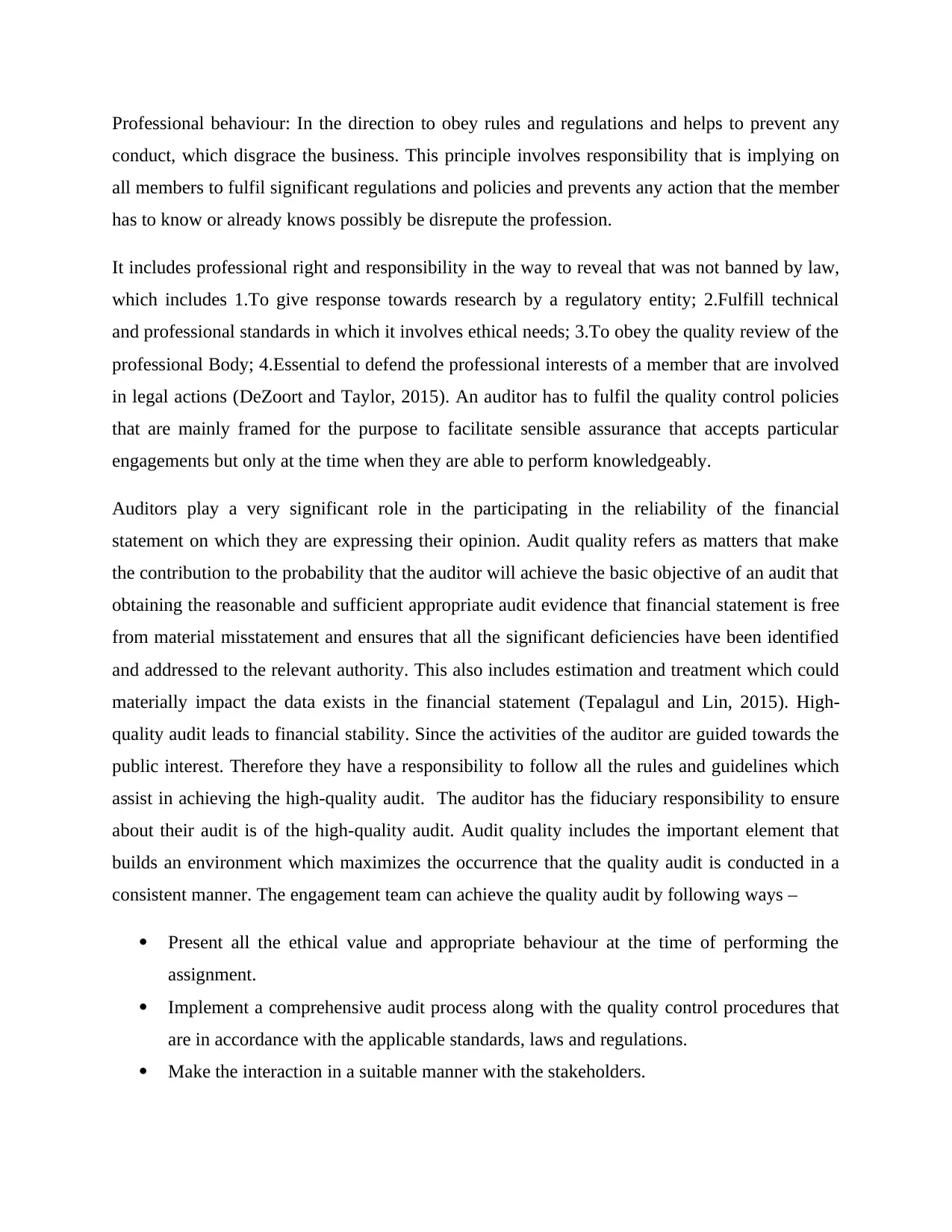
Professional behaviour: In the direction to obey rules and regulations and helps to prevent any
conduct, which disgrace the business. This principle involves responsibility that is implying on
all members to fulfil significant regulations and policies and prevents any action that the member
has to know or already knows possibly be disrepute the profession.
It includes professional right and responsibility in the way to reveal that was not banned by law,
which includes 1.To give response towards research by a regulatory entity; 2.Fulfill technical
and professional standards in which it involves ethical needs; 3.To obey the quality review of the
professional Body; 4.Essential to defend the professional interests of a member that are involved
in legal actions (DeZoort and Taylor, 2015). An auditor has to fulfil the quality control policies
that are mainly framed for the purpose to facilitate sensible assurance that accepts particular
engagements but only at the time when they are able to perform knowledgeably.
Auditors play a very significant role in the participating in the reliability of the financial
statement on which they are expressing their opinion. Audit quality refers as matters that make
the contribution to the probability that the auditor will achieve the basic objective of an audit that
obtaining the reasonable and sufficient appropriate audit evidence that financial statement is free
from material misstatement and ensures that all the significant deficiencies have been identified
and addressed to the relevant authority. This also includes estimation and treatment which could
materially impact the data exists in the financial statement (Tepalagul and Lin, 2015). High-
quality audit leads to financial stability. Since the activities of the auditor are guided towards the
public interest. Therefore they have a responsibility to follow all the rules and guidelines which
assist in achieving the high-quality audit. The auditor has the fiduciary responsibility to ensure
about their audit is of the high-quality audit. Audit quality includes the important element that
builds an environment which maximizes the occurrence that the quality audit is conducted in a
consistent manner. The engagement team can achieve the quality audit by following ways –
Present all the ethical value and appropriate behaviour at the time of performing the
assignment.
Implement a comprehensive audit process along with the quality control procedures that
are in accordance with the applicable standards, laws and regulations.
Make the interaction in a suitable manner with the stakeholders.
conduct, which disgrace the business. This principle involves responsibility that is implying on
all members to fulfil significant regulations and policies and prevents any action that the member
has to know or already knows possibly be disrepute the profession.
It includes professional right and responsibility in the way to reveal that was not banned by law,
which includes 1.To give response towards research by a regulatory entity; 2.Fulfill technical
and professional standards in which it involves ethical needs; 3.To obey the quality review of the
professional Body; 4.Essential to defend the professional interests of a member that are involved
in legal actions (DeZoort and Taylor, 2015). An auditor has to fulfil the quality control policies
that are mainly framed for the purpose to facilitate sensible assurance that accepts particular
engagements but only at the time when they are able to perform knowledgeably.
Auditors play a very significant role in the participating in the reliability of the financial
statement on which they are expressing their opinion. Audit quality refers as matters that make
the contribution to the probability that the auditor will achieve the basic objective of an audit that
obtaining the reasonable and sufficient appropriate audit evidence that financial statement is free
from material misstatement and ensures that all the significant deficiencies have been identified
and addressed to the relevant authority. This also includes estimation and treatment which could
materially impact the data exists in the financial statement (Tepalagul and Lin, 2015). High-
quality audit leads to financial stability. Since the activities of the auditor are guided towards the
public interest. Therefore they have a responsibility to follow all the rules and guidelines which
assist in achieving the high-quality audit. The auditor has the fiduciary responsibility to ensure
about their audit is of the high-quality audit. Audit quality includes the important element that
builds an environment which maximizes the occurrence that the quality audit is conducted in a
consistent manner. The engagement team can achieve the quality audit by following ways –
Present all the ethical value and appropriate behaviour at the time of performing the
assignment.
Implement a comprehensive audit process along with the quality control procedures that
are in accordance with the applicable standards, laws and regulations.
Make the interaction in a suitable manner with the stakeholders.
Secure Best Marks with AI Grader
Need help grading? Try our AI Grader for instant feedback on your assignments.
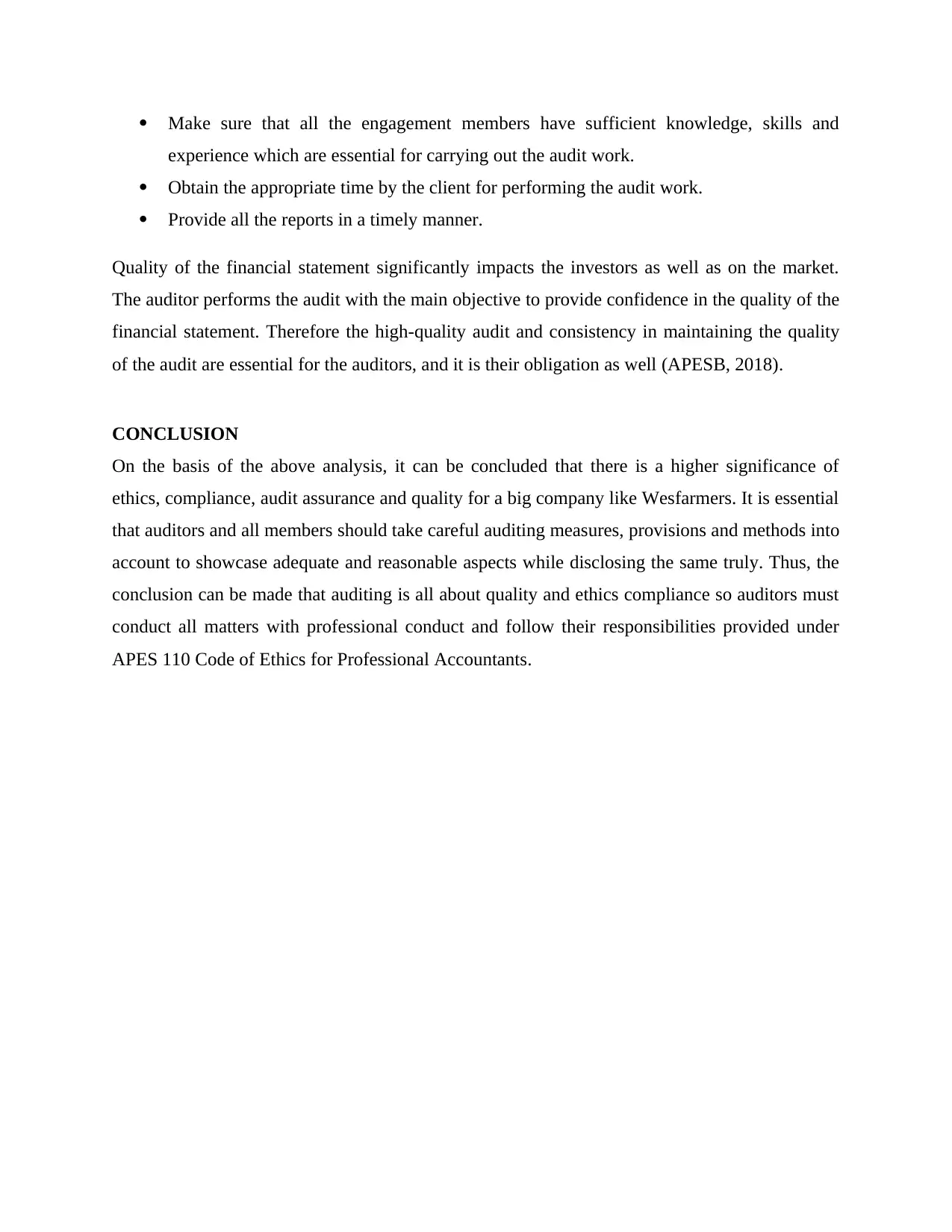
Make sure that all the engagement members have sufficient knowledge, skills and
experience which are essential for carrying out the audit work.
Obtain the appropriate time by the client for performing the audit work.
Provide all the reports in a timely manner.
Quality of the financial statement significantly impacts the investors as well as on the market.
The auditor performs the audit with the main objective to provide confidence in the quality of the
financial statement. Therefore the high-quality audit and consistency in maintaining the quality
of the audit are essential for the auditors, and it is their obligation as well (APESB, 2018).
CONCLUSION
On the basis of the above analysis, it can be concluded that there is a higher significance of
ethics, compliance, audit assurance and quality for a big company like Wesfarmers. It is essential
that auditors and all members should take careful auditing measures, provisions and methods into
account to showcase adequate and reasonable aspects while disclosing the same truly. Thus, the
conclusion can be made that auditing is all about quality and ethics compliance so auditors must
conduct all matters with professional conduct and follow their responsibilities provided under
APES 110 Code of Ethics for Professional Accountants.
experience which are essential for carrying out the audit work.
Obtain the appropriate time by the client for performing the audit work.
Provide all the reports in a timely manner.
Quality of the financial statement significantly impacts the investors as well as on the market.
The auditor performs the audit with the main objective to provide confidence in the quality of the
financial statement. Therefore the high-quality audit and consistency in maintaining the quality
of the audit are essential for the auditors, and it is their obligation as well (APESB, 2018).
CONCLUSION
On the basis of the above analysis, it can be concluded that there is a higher significance of
ethics, compliance, audit assurance and quality for a big company like Wesfarmers. It is essential
that auditors and all members should take careful auditing measures, provisions and methods into
account to showcase adequate and reasonable aspects while disclosing the same truly. Thus, the
conclusion can be made that auditing is all about quality and ethics compliance so auditors must
conduct all matters with professional conduct and follow their responsibilities provided under
APES 110 Code of Ethics for Professional Accountants.
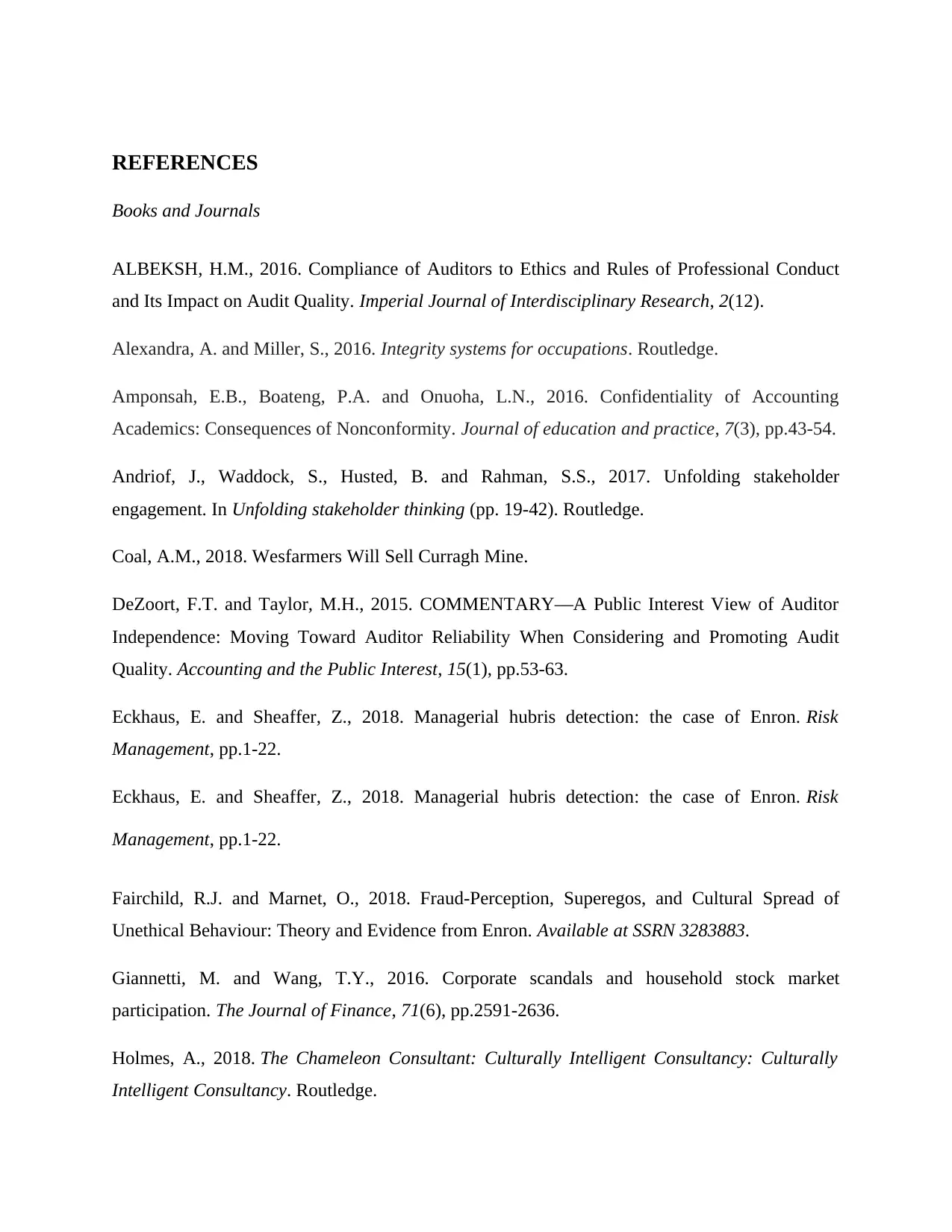
REFERENCES
Books and Journals
ALBEKSH, H.M., 2016. Compliance of Auditors to Ethics and Rules of Professional Conduct
and Its Impact on Audit Quality. Imperial Journal of Interdisciplinary Research, 2(12).
Alexandra, A. and Miller, S., 2016. Integrity systems for occupations. Routledge.
Amponsah, E.B., Boateng, P.A. and Onuoha, L.N., 2016. Confidentiality of Accounting
Academics: Consequences of Nonconformity. Journal of education and practice, 7(3), pp.43-54.
Andriof, J., Waddock, S., Husted, B. and Rahman, S.S., 2017. Unfolding stakeholder
engagement. In Unfolding stakeholder thinking (pp. 19-42). Routledge.
Coal, A.M., 2018. Wesfarmers Will Sell Curragh Mine.
DeZoort, F.T. and Taylor, M.H., 2015. COMMENTARY––A Public Interest View of Auditor
Independence: Moving Toward Auditor Reliability When Considering and Promoting Audit
Quality. Accounting and the Public Interest, 15(1), pp.53-63.
Eckhaus, E. and Sheaffer, Z., 2018. Managerial hubris detection: the case of Enron. Risk
Management, pp.1-22.
Eckhaus, E. and Sheaffer, Z., 2018. Managerial hubris detection: the case of Enron. Risk
Management, pp.1-22.
Fairchild, R.J. and Marnet, O., 2018. Fraud-Perception, Superegos, and Cultural Spread of
Unethical Behaviour: Theory and Evidence from Enron. Available at SSRN 3283883.
Giannetti, M. and Wang, T.Y., 2016. Corporate scandals and household stock market
participation. The Journal of Finance, 71(6), pp.2591-2636.
Holmes, A., 2018. The Chameleon Consultant: Culturally Intelligent Consultancy: Culturally
Intelligent Consultancy. Routledge.
Books and Journals
ALBEKSH, H.M., 2016. Compliance of Auditors to Ethics and Rules of Professional Conduct
and Its Impact on Audit Quality. Imperial Journal of Interdisciplinary Research, 2(12).
Alexandra, A. and Miller, S., 2016. Integrity systems for occupations. Routledge.
Amponsah, E.B., Boateng, P.A. and Onuoha, L.N., 2016. Confidentiality of Accounting
Academics: Consequences of Nonconformity. Journal of education and practice, 7(3), pp.43-54.
Andriof, J., Waddock, S., Husted, B. and Rahman, S.S., 2017. Unfolding stakeholder
engagement. In Unfolding stakeholder thinking (pp. 19-42). Routledge.
Coal, A.M., 2018. Wesfarmers Will Sell Curragh Mine.
DeZoort, F.T. and Taylor, M.H., 2015. COMMENTARY––A Public Interest View of Auditor
Independence: Moving Toward Auditor Reliability When Considering and Promoting Audit
Quality. Accounting and the Public Interest, 15(1), pp.53-63.
Eckhaus, E. and Sheaffer, Z., 2018. Managerial hubris detection: the case of Enron. Risk
Management, pp.1-22.
Eckhaus, E. and Sheaffer, Z., 2018. Managerial hubris detection: the case of Enron. Risk
Management, pp.1-22.
Fairchild, R.J. and Marnet, O., 2018. Fraud-Perception, Superegos, and Cultural Spread of
Unethical Behaviour: Theory and Evidence from Enron. Available at SSRN 3283883.
Giannetti, M. and Wang, T.Y., 2016. Corporate scandals and household stock market
participation. The Journal of Finance, 71(6), pp.2591-2636.
Holmes, A., 2018. The Chameleon Consultant: Culturally Intelligent Consultancy: Culturally
Intelligent Consultancy. Routledge.
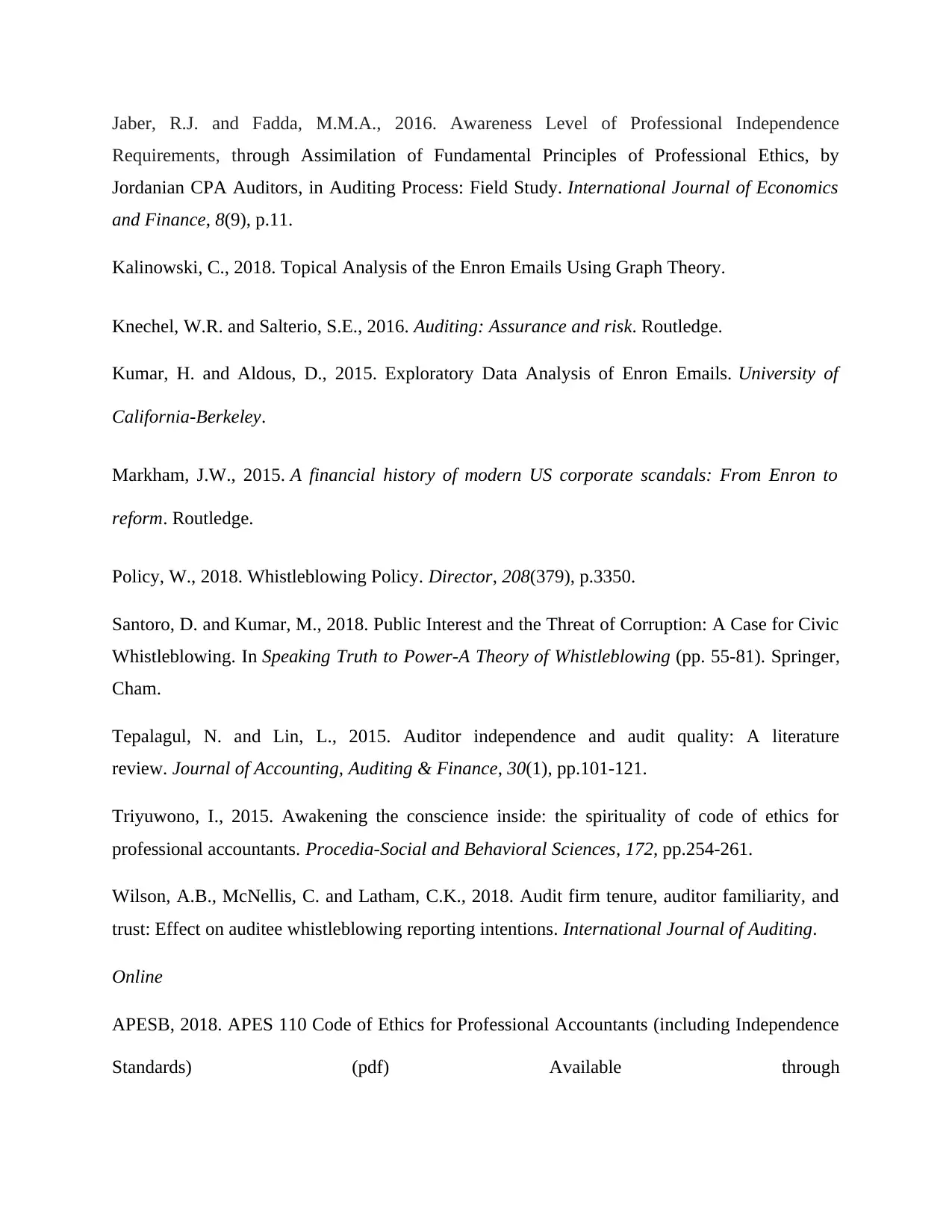
Jaber, R.J. and Fadda, M.M.A., 2016. Awareness Level of Professional Independence
Requirements, through Assimilation of Fundamental Principles of Professional Ethics, by
Jordanian CPA Auditors, in Auditing Process: Field Study. International Journal of Economics
and Finance, 8(9), p.11.
Kalinowski, C., 2018. Topical Analysis of the Enron Emails Using Graph Theory.
Knechel, W.R. and Salterio, S.E., 2016. Auditing: Assurance and risk. Routledge.
Kumar, H. and Aldous, D., 2015. Exploratory Data Analysis of Enron Emails. University of
California-Berkeley.
Markham, J.W., 2015. A financial history of modern US corporate scandals: From Enron to
reform. Routledge.
Policy, W., 2018. Whistleblowing Policy. Director, 208(379), p.3350.
Santoro, D. and Kumar, M., 2018. Public Interest and the Threat of Corruption: A Case for Civic
Whistleblowing. In Speaking Truth to Power-A Theory of Whistleblowing (pp. 55-81). Springer,
Cham.
Tepalagul, N. and Lin, L., 2015. Auditor independence and audit quality: A literature
review. Journal of Accounting, Auditing & Finance, 30(1), pp.101-121.
Triyuwono, I., 2015. Awakening the conscience inside: the spirituality of code of ethics for
professional accountants. Procedia-Social and Behavioral Sciences, 172, pp.254-261.
Wilson, A.B., McNellis, C. and Latham, C.K., 2018. Audit firm tenure, auditor familiarity, and
trust: Effect on auditee whistleblowing reporting intentions. International Journal of Auditing.
Online
APESB, 2018. APES 110 Code of Ethics for Professional Accountants (including Independence
Standards) (pdf) Available through
Requirements, through Assimilation of Fundamental Principles of Professional Ethics, by
Jordanian CPA Auditors, in Auditing Process: Field Study. International Journal of Economics
and Finance, 8(9), p.11.
Kalinowski, C., 2018. Topical Analysis of the Enron Emails Using Graph Theory.
Knechel, W.R. and Salterio, S.E., 2016. Auditing: Assurance and risk. Routledge.
Kumar, H. and Aldous, D., 2015. Exploratory Data Analysis of Enron Emails. University of
California-Berkeley.
Markham, J.W., 2015. A financial history of modern US corporate scandals: From Enron to
reform. Routledge.
Policy, W., 2018. Whistleblowing Policy. Director, 208(379), p.3350.
Santoro, D. and Kumar, M., 2018. Public Interest and the Threat of Corruption: A Case for Civic
Whistleblowing. In Speaking Truth to Power-A Theory of Whistleblowing (pp. 55-81). Springer,
Cham.
Tepalagul, N. and Lin, L., 2015. Auditor independence and audit quality: A literature
review. Journal of Accounting, Auditing & Finance, 30(1), pp.101-121.
Triyuwono, I., 2015. Awakening the conscience inside: the spirituality of code of ethics for
professional accountants. Procedia-Social and Behavioral Sciences, 172, pp.254-261.
Wilson, A.B., McNellis, C. and Latham, C.K., 2018. Audit firm tenure, auditor familiarity, and
trust: Effect on auditee whistleblowing reporting intentions. International Journal of Auditing.
Online
APESB, 2018. APES 110 Code of Ethics for Professional Accountants (including Independence
Standards) (pdf) Available through
Paraphrase This Document
Need a fresh take? Get an instant paraphrase of this document with our AI Paraphraser
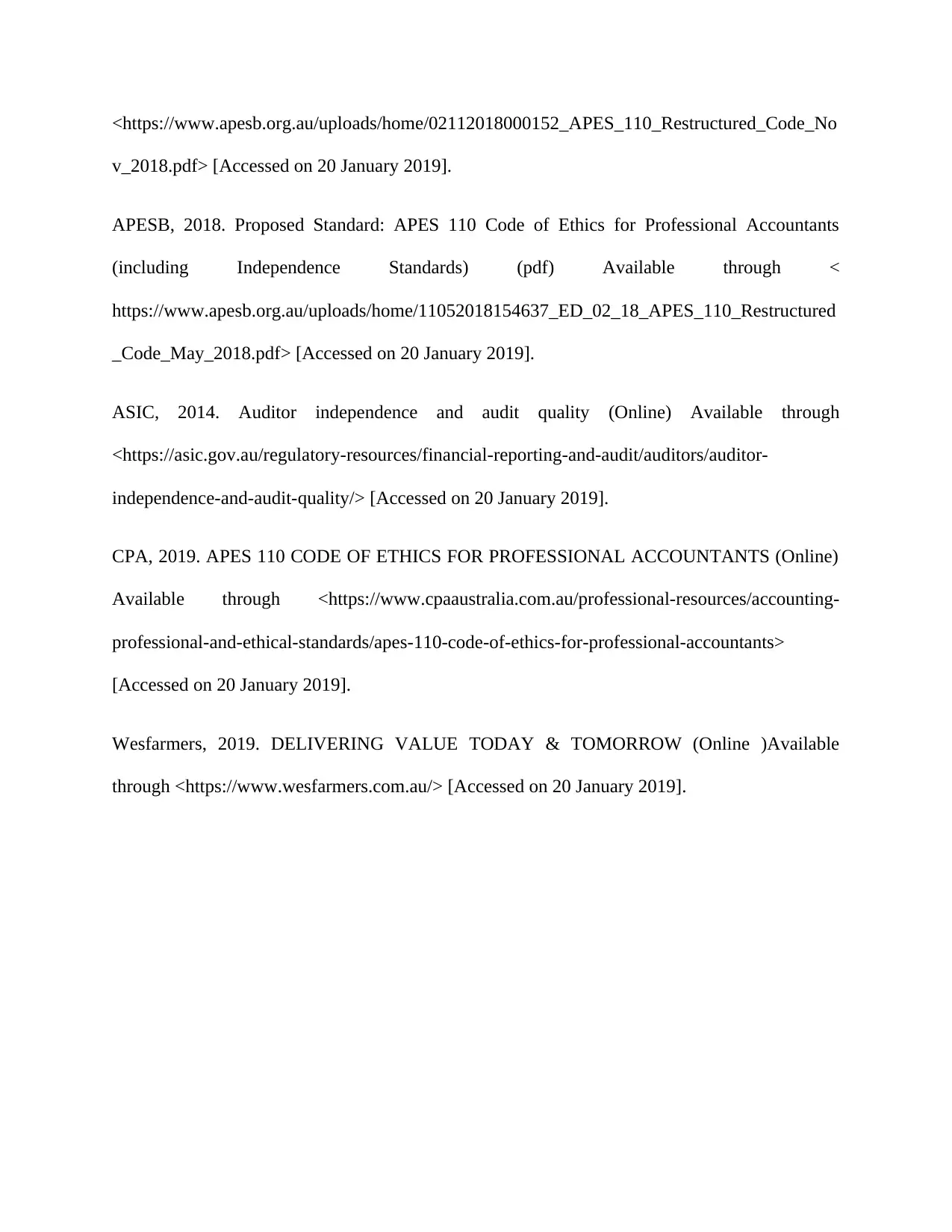
<https://www.apesb.org.au/uploads/home/02112018000152_APES_110_Restructured_Code_No
v_2018.pdf> [Accessed on 20 January 2019].
APESB, 2018. Proposed Standard: APES 110 Code of Ethics for Professional Accountants
(including Independence Standards) (pdf) Available through <
https://www.apesb.org.au/uploads/home/11052018154637_ED_02_18_APES_110_Restructured
_Code_May_2018.pdf> [Accessed on 20 January 2019].
ASIC, 2014. Auditor independence and audit quality (Online) Available through
<https://asic.gov.au/regulatory-resources/financial-reporting-and-audit/auditors/auditor-
independence-and-audit-quality/> [Accessed on 20 January 2019].
CPA, 2019. APES 110 CODE OF ETHICS FOR PROFESSIONAL ACCOUNTANTS (Online)
Available through <https://www.cpaaustralia.com.au/professional-resources/accounting-
professional-and-ethical-standards/apes-110-code-of-ethics-for-professional-accountants>
[Accessed on 20 January 2019].
Wesfarmers, 2019. DELIVERING VALUE TODAY & TOMORROW (Online )Available
through <https://www.wesfarmers.com.au/> [Accessed on 20 January 2019].
v_2018.pdf> [Accessed on 20 January 2019].
APESB, 2018. Proposed Standard: APES 110 Code of Ethics for Professional Accountants
(including Independence Standards) (pdf) Available through <
https://www.apesb.org.au/uploads/home/11052018154637_ED_02_18_APES_110_Restructured
_Code_May_2018.pdf> [Accessed on 20 January 2019].
ASIC, 2014. Auditor independence and audit quality (Online) Available through
<https://asic.gov.au/regulatory-resources/financial-reporting-and-audit/auditors/auditor-
independence-and-audit-quality/> [Accessed on 20 January 2019].
CPA, 2019. APES 110 CODE OF ETHICS FOR PROFESSIONAL ACCOUNTANTS (Online)
Available through <https://www.cpaaustralia.com.au/professional-resources/accounting-
professional-and-ethical-standards/apes-110-code-of-ethics-for-professional-accountants>
[Accessed on 20 January 2019].
Wesfarmers, 2019. DELIVERING VALUE TODAY & TOMORROW (Online )Available
through <https://www.wesfarmers.com.au/> [Accessed on 20 January 2019].
1 out of 14
Related Documents
Your All-in-One AI-Powered Toolkit for Academic Success.
+13062052269
info@desklib.com
Available 24*7 on WhatsApp / Email
![[object Object]](/_next/static/media/star-bottom.7253800d.svg)
Unlock your academic potential
© 2024 | Zucol Services PVT LTD | All rights reserved.





